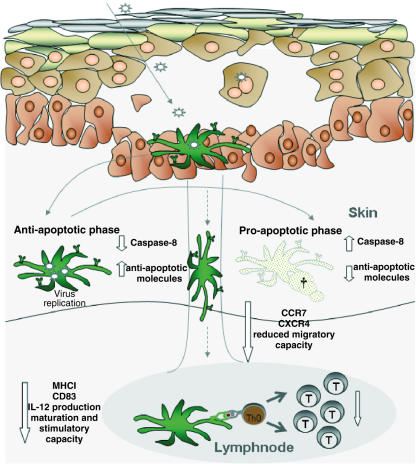Fig. 2.
Interaction of herpes simplex virus (HSV) with dendritic cells (DC). Infection with HSV of the skin goes along with the ballooning degeneration of epithelial cells which lose intracellular adhesion, leading to intra-epidermal vesicles. Infection of skin DC with HSV induces a primary anti-apoptotic phase with rapid viral replication and a second pro-apoptotic phase of DC. Further, HSV infection down-regulates the surface expression of co-stimulatory molecules and MHC molecules on DC and slows down the maturation and migration of DC to the peripheral lymphnodes, which together results in a lower stimulation of T cells by DC.

